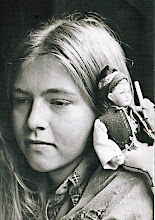Streetcars have a certain aura of romance that buses can never match. For some people it's a sentimental longing for the old-fashioned, but there is something inherently romantic about streetcars too. In the old days, streetcars were often just as busy on weekends as during the week, transporting people to amusement parks and beaches. Some of the older cars were open double-deckers, offering fresh air and a great view of the passing scenery. You can bet that lots of people have met and fallen in love on streetcars everywhere. Most of these stories don't make the papers, but some do (and often involve the conductors!):
In September, 1870, the Chicago Times reported that a young lady on the West side had fallen in love with a streetcar conductor. Her parents did not approve and locked her in her room, where she could only weep and watch the streetcar from her window. It seems that her parents particularly objected to her interest in a conductor of a horse-drawn streetcar and they would have approved had it only been a a steam-powered streetcar. The newspaper reported that "they will not sanction her union with a conductor of a vehicle propelled by quadrupedal power."
In November 1905, the New York Times reported that Lucilla Smith, an heiress to the Smith Paper Company, had fallen in love with a former streetcar conductor and married him, much to her family's dismay. After graduating from Wellesley and returning home to Pittsfield, Massachusetts from a "finishing tour" of Europe, Miss Smith had met the streetcar conductor and immediately fallen in love. The newspaper reported that, "the girl was often seen taking long rides through the hills on Conductor Dickie's car." At least they waited until he was promoted to a clerk position to get married.
On October 9, 1949, in an article entitled "Romance Fades - Court Hears Complaints About Ding Dong Daddy", the Reading-Eagle reported that in San Francisco, the Romeo of the "D" car line married some 14 wives without divorcing the previous ones. On September 16 of the previous year, the "tubby little Romeo", a former streetcar conductor, married an Oakland chambermaid. After a year, the chambermaid took him to court, saying that the once "alltogether too amorous" man had become grumpy and irritable and was accepting too many drinks at the Oakland waffle shop. He blamed his behavior on his wife's visit to the dentist and her resulting poor health, saying, "I guess her gums are hurting." He was sent to San Quentin, not for grumpiness and irritability, but for polygamy.













